From 18–21 January, 23 secondary school science teachers travelled to the University of Otago to participate in a unique Professional Learning and Development (PLD) programme with accommodation provided on campus. The teachers represented 22 different schools in ten regions: South Auckland, Waikato, Bay of Plenty, Taranaki, Manawatu, Wellington, Nelson, Canterbury, the West Coast and Southland.
The Science Academy (OUASSA) specifically reaches out to science teachers in schools which are small, rural or provincial, and/or decile 6 or below. Teaching in isolated schools poses numerous challenges for teachers when it comes to getting sufficient professional development. Courses are often held in the main centres which could be many hours' drive from their schools. Setting relief work in preparation for being away at a course is time consuming. For beginning teachers, the isolation and lack of subject-specific training can be stressful. Even for experienced science teachers, keeping up with the latest research and practical techniques is an ongoing challenge when based in rural or provincial schools.
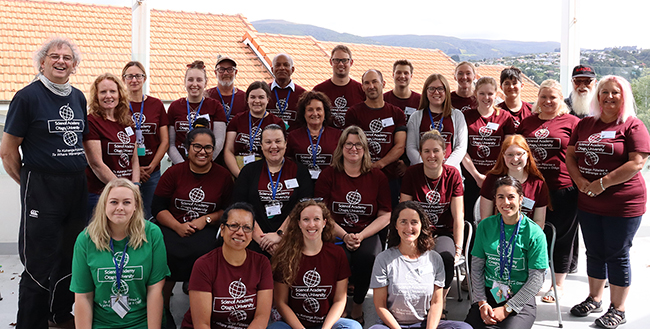 The January 2021 group of teachers (in dark red shirts), senior student helpers (green shirts), staff of the Science Academy (black shirt: Steve Broni, grey shirt: Petrina Duncan) and Hata Temo (back row on far right), our Kaitohutohu Māori Advisor. (Photo credit: Mariana Te Pou)
The January 2021 group of teachers (in dark red shirts), senior student helpers (green shirts), staff of the Science Academy (black shirt: Steve Broni, grey shirt: Petrina Duncan) and Hata Temo (back row on far right), our Kaitohutohu Māori Advisor. (Photo credit: Mariana Te Pou)
A generous grant from the Cognition Education Trust allowed the Science Academy to offer 16 fully funded places to teachers on the PLD programme in 2021. These places were preferentially offered to teachers whose schools had nominated at least one student for the Science Academy 2021 Student Programme.
Day One: Arrival, Formal Welcome and Forensic Science Workshop
The programme started with introductions and a mihi whakatau (formal welcome). After dinner, teachers attended an interactive workshop about Forensic Science, facilitated by Dr Angela Clark (Faculty of Dentistry).
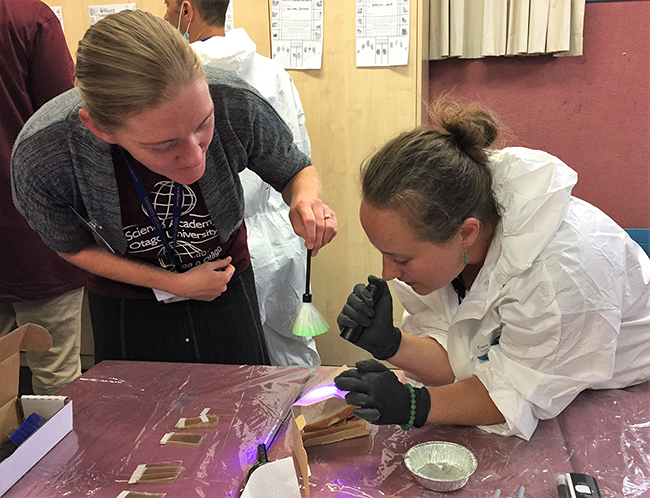 A teacher (left) learns the art of fingerprint detection from Dr Angela Clark (right).
A teacher (left) learns the art of fingerprint detection from Dr Angela Clark (right).
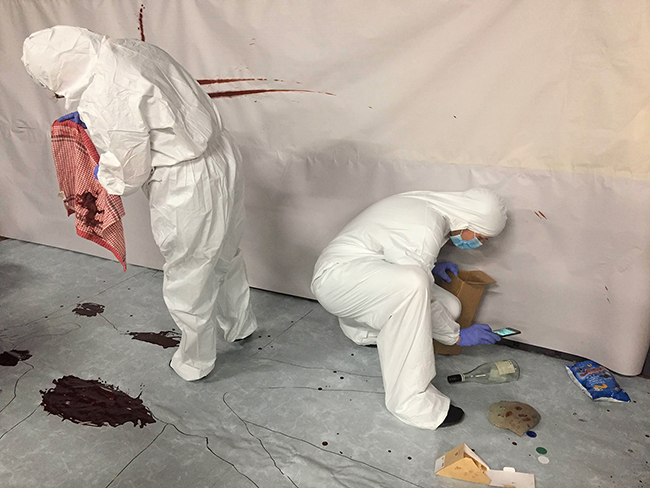 Teachers wear full PPE to inspect evidence at a mock crime scene.
Teachers wear full PPE to inspect evidence at a mock crime scene.
Forensic Science is an increasingly popular choice for teaching junior science concepts. This workshop gave teachers an introduction to the subject and hands-on experience in the various techniques involved. The teachers worked in small teams to investigate and deconstruct a mock crime scene, taking all the evidence back to a 'forensics lab' to be examined. The overall aim was to determine what may have happened at the mock crime scene using critical thinking, scientific testing, evidence-based inferences and collaboration. Teachers learned techniques for analysing fingerprints, bite marks, blood splatter patterns, footprints, shoe treads, soil and handwriting. The workshop was greatly enjoyed by the teachers, especially the hands-on approach and a discussion of how this activity could be used in a classroom setting to increase students' critical thinking skills.
Day Two: Citizen Science Workshop and Field Trip to Taiaroa Head
The citizen science day aimed to introduce teachers to a range of local and national science projects which students can participate in. In the morning, seven project facilitators based in Otago gave short presentations about their citizen science work. Their projects were diverse, such as harbour water sampling, soil microbiology, monitoring coastal lagoons and measuring air quality. The speakers also described how they obtained funding and engaged with their local communities, scientists and schools.
The afternoon field trip was to the Royal Albatross Centre at Taiaroa Head on Otago Peninsula. The two facilitators, Dr Sally Carson (NZ Marine Studies Centre) and Ben Knight (Sustainable Coastlines), introduced their national citizen science projects, Marine Metre Squared (MM2) and Litter Intelligence respectively. Everyone then donned raincoats and walked down to nearby Pilots Beach. Half the teachers spent the next 30 minutes collecting all the litter they could find along a transect near the high tide mark. The other group learned how to carry out counts of marine animals and plants on the rocky shore in 1m2 quadrats. The two groups then swapped over.
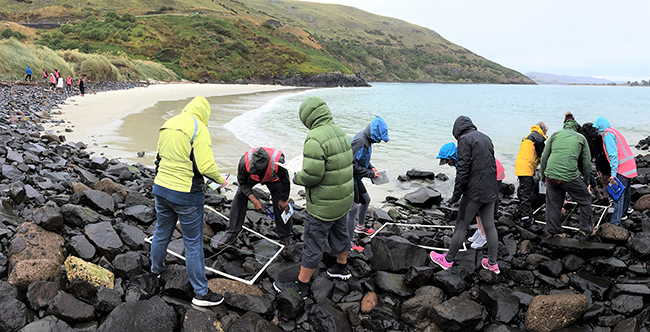 Teachers count rocky shore creatures (foreground) and collect beach litter (in background).
Teachers count rocky shore creatures (foreground) and collect beach litter (in background).
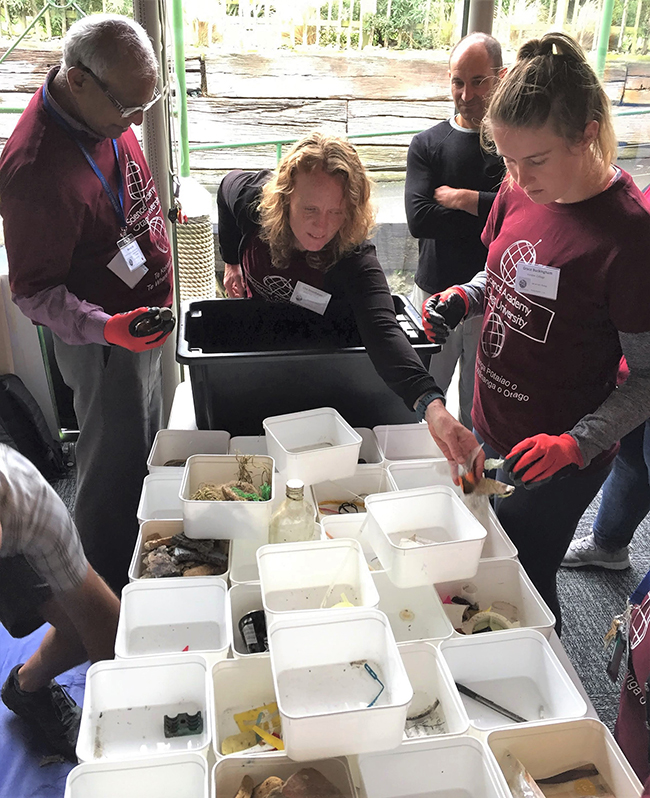 Teachers sorting beach litter into categories for the Litter Intelligence project.
Teachers sorting beach litter into categories for the Litter Intelligence project.
Back in the education room, the litter was sorted into different categories then counted, weighed and entered into a national online database of coastline clean-up data from around New Zealand. Teachers were also shown how the rocky shore MM2 data could be entered into an online database and used as a resource for internal assessments and other projects. The day concluded with a guided tour to view the albatross breeding colony at close range from a viewing hide.
Day Three: The Science of Sport and Subject Specific Laboratory Sessions
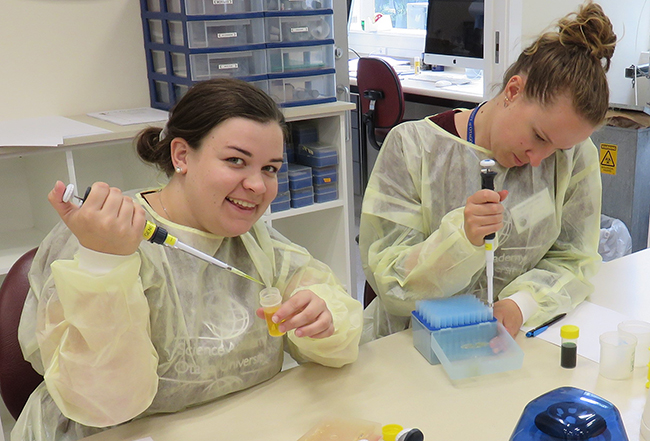
Teachers spent the morning learning how to apply scientific concepts to sport and exercise, specifically for teaching physics to junior science classes (Year 9-10). Dr Neil Anderson (School of Physical Education, Sport and Exercise Science) taught the group about analysing motion and the trajectory of a ball using cameras and digital software.
The teachers then split into their specialist teaching subjects (biology, chemistry and physics) to learn about practical laboratory-based activities for senior students. The physics teachers were led by Dr Esther Haines at the Department of Physics on a tour through the research labs including the Antarctic cold room. Polarising filters were used to analyse crystal networks in ice cores. They also covered ideas for teaching electricity, electromagnetism and waves.
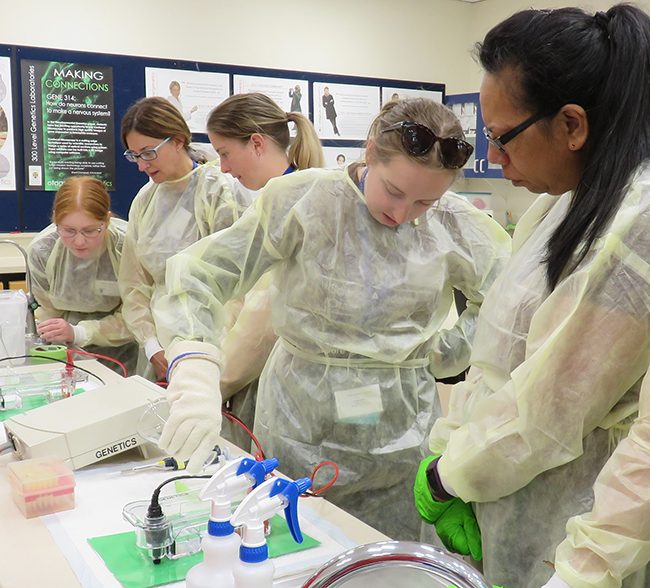 Biology teachers practise their techniques with micropipettes and gel electrophoresis.
Biology teachers practise their techniques with micropipettes and gel electrophoresis.
In the Department of Chemistry, Dr Dave Warren ran through some experiments with the teachers in his group. These included making and measuring conducting polymers, silver plating some conical flasks and using a nanoparticle simulator. Of particular value to teachers was a discussion about first year university chemistry courses and how to prepare students more adequately for transitioning from school to university level chemistry.
The biology teachers enjoyed practical work in the Department of Biochemistry with Dr Gillian MacKay, learning how to carry out genetic techniques such as gel electrophoresis. Links were made to the DNA evidence from forensic science workshop earlier in the week. Teachers also heard about the free resources that can be borrowed by schools across NZ such as the 'Genetics on the GO' suitcase, created by Genetics Otago for use in a biology classroom.
Day Four: Storytelling in Science and Bringing it all Together
During the last morning of our programme, Dr Kaitlyn Martin shared her experiences of how storytelling and filmmaking can increase student engagement with science topics. She offered ideas, resources and a chance for brainstorming amongst the teachers.
For the remainder of the morning, the teachers spent time sharing resources, networking in small groups, looking over their teaching programmes for the upcoming year and planning. This session always proves popular because teachers rarely have the time to properly discuss and share the knowledge they have gained at PLD workshops while they are still together.
The value of professional development for teachers
Our teacher PLD programme aims to bridge the wide gap between science teachers in isolated, small or low decile schools and the world of university level science. By bringing teachers to the University of Otago for four days, they gain substantial knowledge, meet a range of skilled academic staff and create connections where resources can be shared. We aim to make teachers feel more inspired, recharged and motivated to keep bringing new ways of teaching into their classrooms.
A big thank you to the 23 teachers who participated enthusiastically in all aspects of this year's programme. We also acknowledge the University teaching staff who worked so hard leading up to, and during, the week to make their workshops amazing. Thanks to the citizen science project facilitators who gave up their time to share their experiences, knowledge and passion for science with our teachers. This year we are incredibly grateful to the Cognition Education Trust for their grant, enabling us to have the largest ever group of teachers at our programme.
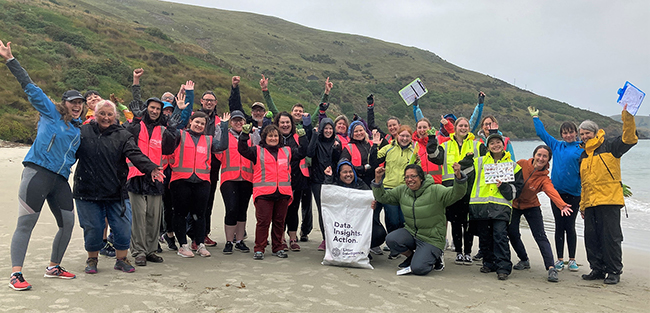 Teachers and project facilitators on Otago Peninsula.
Teachers and project facilitators on Otago Peninsula.
Overall programme feedback from the teachers
“The PLD workshop got me excited again about Science and teaching it to my students. A lot of the PD I have attended is specifically focused on pedagogy and not much of it is applicable to a specifically Science concept. It was great hearing from Scientists and university professors about ways to implement Science throughout the curriculum. The resources and information I received during this PLD is invaluable especially since there is so little of it out there in New Zealand.”
“The PLD allowed me to make networks across New Zealand, and also to make very valuable connections with University staff. Often as teachers you don't necessarily get feedback from universities as to what students lack or what needs to be taught better, so having been given the opportunity to network was amazing.”
“We were given many resources that were rich in their applicability and usefulness in the classroom. I developed a new respect for the collaborative nature of science and I can use this knowledge and experiences in helping my students appreciate this aspect of the nature of science. I received valuable insights into using software tools that are directly applicable to my physics teaching. As a teacher, I have felt isolated from those in the science community actively carrying out research.”
“All the teachers agreed that this experience was memorable, inspiring and valuable. I have attended several OUASSA teacher PLD programmes over the last 10 years and this year the programme was immaculately organised and the variety of workshops was fascinating. This year, we teachers came away with a real sense of enthusiasm about our role in making citizens aware of the crucial role that science plays in society. I am extremely grateful for the opportunity to take part in this excellent programme.”
